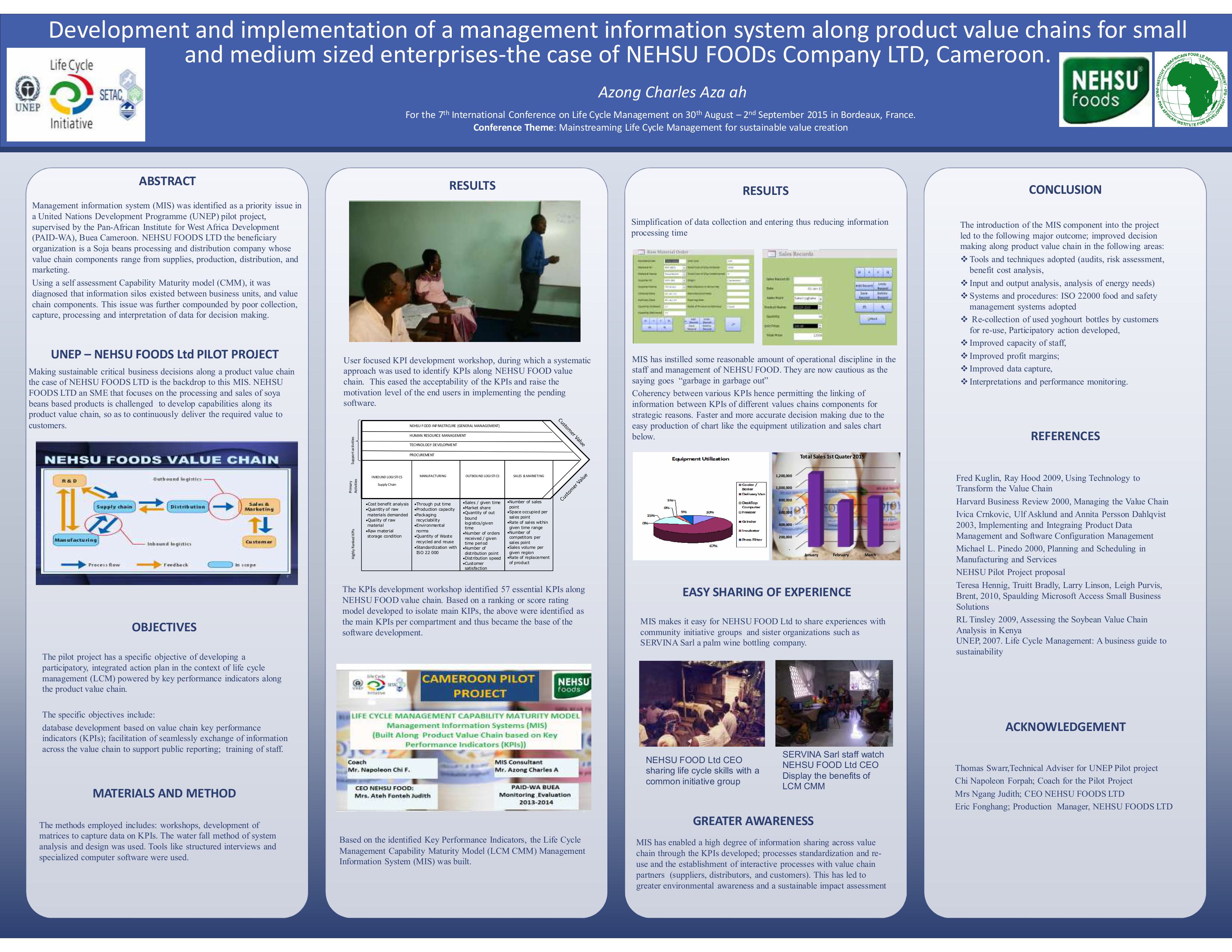Developing Sustainable Value Chains: Insights from NEHSU FOODS Ltd's MIS
NEHSU FOODS Ltd.'s implementation of a Management Information System (MIS) through a UNEP pilot project highlights the transformative potential of unified systems and KPI-driven strategies in achieving sustainable value chains and operational excellence.

Developing Sustainable Value Chains: Insights from NEHSU FOODS Ltd's MIS
Implementation
Introduction
In today’s interconnected world, achieving sustainability and operational efficiency is not just a goal but also a necessity. One organization leading the charge is NEHSU FOODS Ltd., a soybean processing and Distribution Company in Cameroon. Through a United Nations Development Programme (UNEP) pilot project, NEHSU implemented a cutting-edge Management Information System (MIS) designed to optimize its product value chain. This initiative provides invaluable lessons for businesses and environmental organizations worldwide.
The Challenge
Like many small and medium enterprises (SMEs), NEHSU FOODS Ltd faced significant hurdles:
- Information Silos: Key business units and value chain components were disconnected, hindering collaboration.
- Data Inefficiencies: Challenges in data collection, processing, and interpretation affected decision-making.
- Limited Strategic Alignment: KPIs across the value chain were not linked, resulting in fragmented insights.
Setting Objectives
The MIS implementation project aimed to overcome these challenges with a comprehensive, participatory approach. The specific objectives included:
- Building a Robust Database: Capturing and managing key performance indicators (KPIs) along the product value chain.
- Facilitating Transparency: Enabling seamless information exchange to support public reporting.
- Empowering Employees: Providing targeted training to enhance the effective use of the MIS.
Methodology
The project’s success was built on a well-defined approach:
- Workshops: Stakeholders collaboratively identified and prioritized 57 critical KPIs.
- Life Cycle Management (LCM): A sustainability-focused framework ensured long-term value creation.
- Capability Maturity Model (CMM): This diagnostic tool highlighted inefficiencies and guided improvement strategies.
- Innovative Tools: Structured interviews, risk assessments, and specialized software supported effective implementation.
Results and Achievements
The implementation of MIS at NEHSU FOODS Ltd led to transformative outcomes across multiple dimensions:
Operational and Strategic Benefits
- Enhanced Decision-Making: Real-time insights powered by KPIs such as equipment utilization and sales performance.
- Increased Efficiency: Improved throughput times and process standardization, aligning operations with ISO 22000.
- Improved Environmental Impact:
- Increased packaging recyclability.
- Significant waste reduction through reuse initiatives.
Quantifiable Gains
- Profit Margins: Streamlined operations and waste minimization boosted profitability.
- Data Accuracy: Enhanced data capture and monitoring systems ensured reliability.
Broader Impacts
- Community Engagement: The MIS facilitated knowledge sharing with community groups and sister organizations, such as SERVINA Sarl, fostering a culture of sustainability.
- Sustainability Awareness: The integration of KPIs promoted greater environmental consciousness and sustainable decision-making.
Lessons for the Future
NEHSU FOODS Ltd’s experience offers a roadmap for organizations seeking to integrate sustainability and operational excellence:
- Break Down Silos: Unified systems are critical for cohesive operations and strategic alignment.
- Focus on KPIs: Identifying and monitoring key metrics drives targeted improvements.
- Share Knowledge: Collaboration with stakeholders amplifies impact and promotes sustainability.
Conclusion
The success of the MIS implementation at NEHSU FOODS Ltd highlights the transformative potential of integrating technology with sustainability-focused practices. As the Watershed Task Group continues to champion innovative solutions, this project serves as a testament to the power of collaboration, innovation, and strategic planning. By adopting similar frameworks, organizations can not only achieve operational efficiency but also contribute meaningfully to global conservation efforts.
Call to Action
To learn more about sustainable value chains and explore how your organization can benefit from similar initiatives, connect with the Watershed Task Group today. Let us work together to create a sustainable future.
